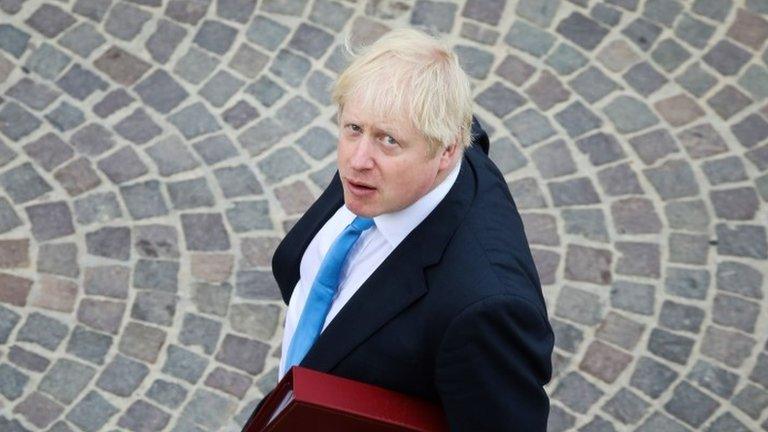A week of many moving parts?
- Published
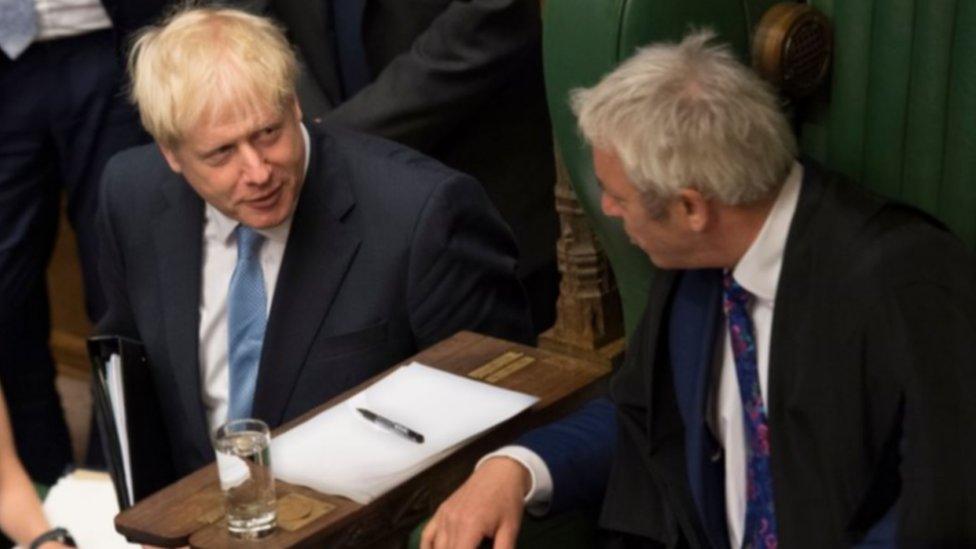
The PM and the Speaker could have a busy few days ahead
Fasten your safety belts - it's going to be a rough ride. This weekly lookahead is normally based on a pretty firm published agenda for the Lords, the Commons and the committees, and while there is indeed a detailed programme of events out there, much of it looks certain to be discarded as normal parliamentary business is consumed, once again, by Brexit.
At the moment the consensus seems to be a chain of events something like this will unfold:
On Tuesday 3 September the anti no-deal/Remain MPs around the former ministers Oliver Letwin and Yvette Cooper apply for an emergency debate under Standing Order 24, and Mr Speaker grants their application, and further allows the debate to be held later that day.
Equally importantly he accepts amendments to what would normally be a neutral and unamendable motion. Given a majority, this would give a cross-party alliance the chance to ram through a new bill on postponing Brexit, and to commandeer more Commons days when they're in command of the order paper.
On Wednesday 4 September they would seek to put their bill through all its Commons stages, so that it could be debated in the Lords on Thursday 5 September. This could require extra time to beat a filibuster, because although the Lords is an overwhelmingly Remain chamber, its debates are not timetabled in the manner of the Commons
Overnight shifts?
So a handful of peers prepared to speak at length could, potentially, delay the bill for crucial hours. Watch out for the rarely used motion that "The Noble Lord be no longer heard", which could be employed to shut down a filibuster - although it would require an individual vote against each peer, and that would, itself, take 15 to 20 minutes.
I'm told opposition peers are already making arrangements for sitting overnight and in shifts, if required, and the Labour peers group has been put on a standby three-line whip for Wednesday, Thursday and Friday. There's even talk of sitting into the weekend.
The key issue here is that the prime minister is now armed with the power to prorogue Parliament from Monday, and to become law the bill will have to receive royal assent before that happens.
So an effective rearguard action could mean the Letwin-Cooper alliance is caught on its feet when the music stops.
A key requirement is that the bill should be amended in the Lords - either because it had some technical deficiency or because of hostile action. Were that to happen, the bill would have to be ping-ponged back to the Commons so that MPs could approve any changes, probably on Monday 9 September, which might allow the PM to prorogue before they had the chance.
So there are plenty of moving parts in this scheme, any one of which could seize up. There may not be a Commons majority at the first hurdle, or it might break down at some later stage of consideration of the bill.
Tory rebels, Labour Brexiteers and independent MPs will doubtless come under enormous pressure. There might be successful resistance in the Lords, or some unexpected flaw in the bill might emerge and complicate matters.
After all, the government whips and parliamentary business managers have had an entire summer to come up with stratagems and ruses to use against their opponents, and the full weight of the government machine will be brought to bear.
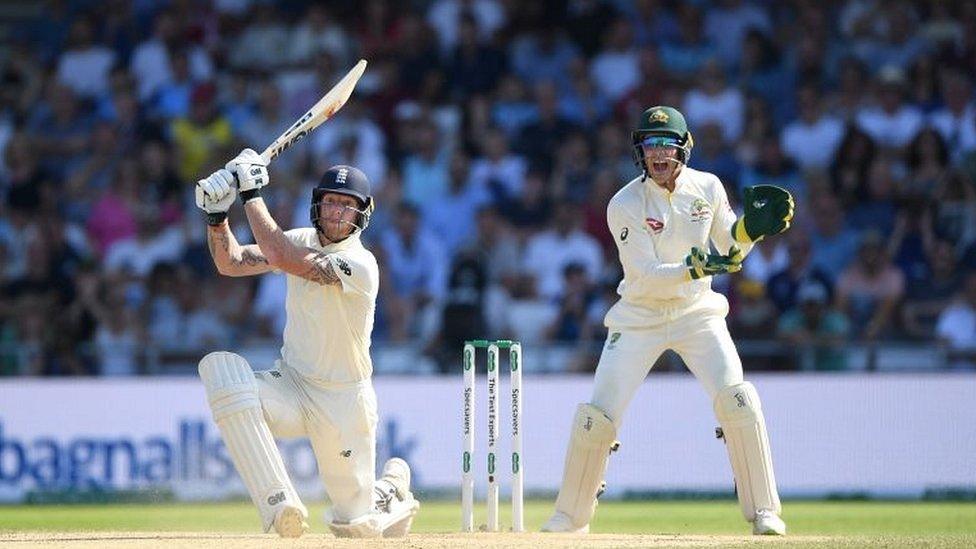
Will MPs face their own version of the agony of the Headingley Test?
This may be particularly important in the Lords, where Theresa May's government quietly smoothed the path of the last bill to postpone Brexit. A Johnson government will certainly fight every inch of the way. This will be for parliamentary procedure nerds what the Headingley Test match was to cricket fans - an extraordinary, agonising, knife-edge contest.
One probable consequence will be to prevent the government announcing its spending review, perhaps till the following week.
And so important is that package of announcements to the government, that prorogation could be at the later end of the possible dates agreed by the Queen.
But after all that, here's my rundown of the (scheduled) week ahead:
Tuesday 3 September
The Commons reconvenes (14:30) for Foreign Office Questions, providing a dispatch box debut for new Foreign Secretary Dominic Raab and his newly minted ministers.
The day's Ten Minute Rule Bill from Croydon MP Chris Philp is on clean air - his constituency covers a highly congested route into London, so his proposals about low-emission zones, vehicle idling and promoting electric vehicles reflect local concerns about air quality.
Then MPs are due to knock off the remaining stages of the almost completely uncontroversial Census (Return Particulars and Removal of Penalties) Bill, which deals with the provision of particulars about sexual orientation and gender identity.
Finally Shadow Brexit minister Jenny Chapman has an adjournment debate on the implications for the sheep industry of the UK leaving the EU without a deal.
In Westminster Hall, the subjects for debate include the EU Settlement Scheme (the scheme to enable EU citizens and their family members to stay in Britain after Brexit) as it applies to looked-after children and care leavers (11:30) and on the Committee Corridor, the Defence Committee (14:45) hears from expert witnesses about the domestic threat of drones .
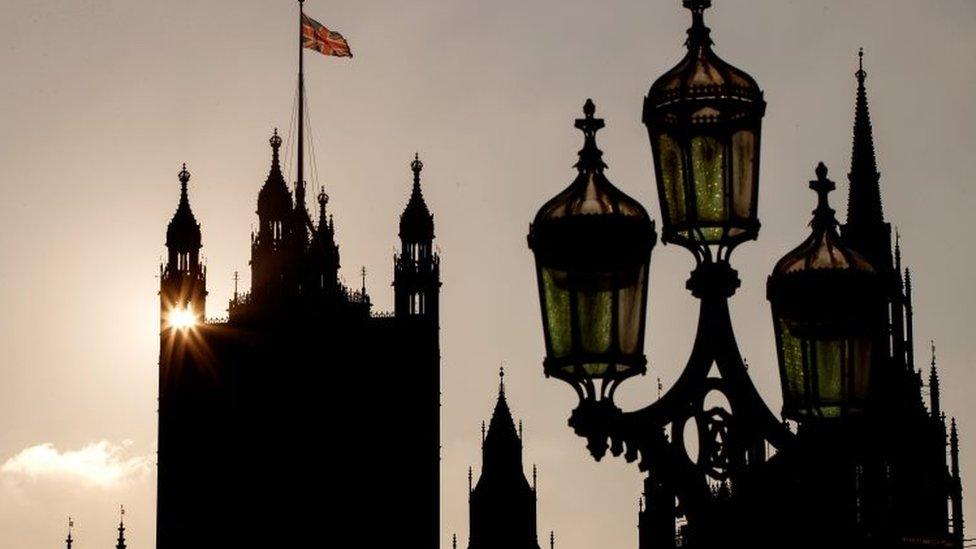
The state of the Palace of Westminster is up for debate
In the Lords (14:30) questions from peers include Labour's Lord Foulkes of Cumnock asking about the date for the next Queen's Speech - now confirmed as 14 October. This may provide an opportunity for griping about the government's prorogation plans, and may be followed up with some opposition motion to confirm that the House will give priority to considering anti-no-deal measures approved by the Commons.
The day's main business will be the Parliamentary Buildings (Restoration and Renewal) Bill - the measure which sets up the structure to administer the proposed multi-billion-pound restoration of the Victorian Palace of Westminster. This is the report stage of consideration, which is where peers normally move from "probing" the government's intentions to attempting to make substantive changes to the wording of the bill. Most of the amendments seem to be minor tweaks, but Labour's Lord Blunkett has an amendment to spread the economic benefits of scheme across the UK.
Then there is a debate, led by the Bishop of St Albans, the Rt Rev Alan Smith, on the implementation of the recommendations of the Parliamentary Commission on Banking Standards (a body which included Archbishop of Canterbury Justin Welby) and the opportunities for further banking reform
And watch out for the hearings of the Lords Select Committee on the Social and Economic Impact of the Gambling Industry, which is looking at the effectiveness of the Gambling Act 2005, and the obligation of operators to protect customers from gambling harm, with witnesses from the Gambling Review Body, Regulus Partners, Queen Mary University, and a former barrister specialising in gambling and regulated entertainment.
Wednesday 4 September
The Commons opens (11:30) with half an hour of Wales questions, followed, at noon by Boris Johnson's debut Prime Minister's Question Time - which could provide quite an appetiser to a bill to postpone Brexit, if MPs have agreed to changes to their order paper (see above).
The Ten Minute Rule Bill, proposed by Labour's Emma Hardy, aims to give councils increased compulsory purchase powers. And then MPs are supposed to be completing their consideration of the fairly uncontroversial Animal Welfare (Sentencing) Bill, which would increase the maximum sentence for animal cruelty offences from six months to five years in England and Wales.
The adjournment debate, led by Conservative Robert Halfon, is by my count his fifth debate on the need for a new hospital in his Harlow constituency. Previously he had pushed the case to health ministers, and they have admitted that a new hospital is needed. This time, by making his subject the Treasury funding for the Department of Health and Social Care, he will attempt to put the case directly to the ministers who control the government purse-strings.
In Westminster Hall, the subjects for debate include artists' visas (09:30); emissions from vessels on the river Thames (11:00); teaching on LGBT community and acceptance in schools (14:30) and the use of suicide risk assessment tools in the NHS (16:00).
On the Committee Corridor my eye was caught by the joint Education and Work and Pensions hearing on School holiday poverty (09:30), with witnesses from schools and charities as well as DWP minister Will Quince and Education minister Lord Agnew. This subject has been a key concern of the Work and Pensions Committee Chair, Frank Field, who has demonstrated in a series of joint inquiries that working with other select committees can greatly increase the impact of their conclusions.

Popcorn time? Michael Gove will be talking about Brexit on Wednesday
Another one to watch is the appearance of Chancellor of the Duchy of Lancaster Michael Gove before the Brexit Committee (10:00) to talk about no-deal preparations and the negotiations on EU withdrawal. Bring popcorn.
In the Lords (15:00) peers have a series of legislative chores scheduled, in the form of the detailed committee stage consideration of the Non-Domestic Rating (Public Lavatories) Bill [HL] and the report stage of the Sentencing (Pre-consolidation Amendments) Bill, before they move on to the Second reading of the High Speed Rail (West Midlands - Crewe) Bill. There might be some question about whether they should be debating the measure when the government has decided to review the HS2 programme.
Thursday 4 September
The Commons day opens (09:30) with Brexit Questions, after which the new Leader of the House, Jacob Rees-Mogg, will announce forthcoming Commons business. Which could be rather interesting, especially if he is not in control of much of it.
There will be a brief Select Committee Statement from Norman Lamb, the Lib Dem chair of the Science and Technology Committee on their latest report, Clean Growth: Technologies for Meeting the UK's Emission Reduction Targets. Former Health minister Mr Lamb has announced he will be standing down at the next election, so expect a few compliments for a respected Commons figure.
Then MPs turn to backbench debates, starting with the SNP's Drew Hendry, leading a debate on the UK Shared Prosperity Fund. The motion notes that the government has not provided details of how it will distribute the money allocated to replace EU assistance to the regions, after Brexit.
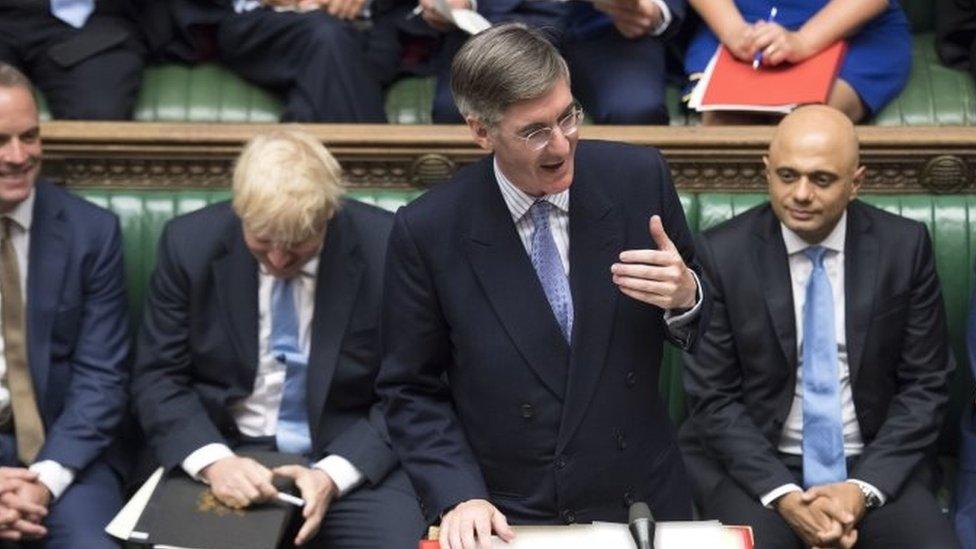
Jacob Rees-Mogg returns
Then Labour's Siobhain McDonagh has a debate on the British housebuilding industry - noting the lack of affordable homes and pointing to executive pay levels in the big housebuilding companies.
In Westminster Hall (13:30) Conservative Henry Smith, chair of the All-Party Parliamentary Group on Heart and Circulatory Diseases, leads a debate on the involvement of patients in the use of artificial intelligence in healthcare.
He will argue that AI can lead to faster and more accurate diagnoses, personalised treatment, better targeting of demand and better predictions of conditions, but there are concerns about the way in which patient data is used and about patient anonymity.
That is followed by a debate on hernia mesh in men, led by the DUP's Jim Shannon. He says that, as with the use of mesh to treat women, this form of treatment has "rather worrying" side-effects, resulting in many men living with chronic pain.
In the Lords (11:00) the main scheduled events are debates on subjects chosen by crossbenchers. The first is on reforming the management and treatment of offenders in prison and the community, led by crossbencher and former Chief Inspector of Prisons, Lord Ramsbotham.
There's quite a decent speakers' list, including a number of ex-judges, and Lib Dem Lord Beith, who, as chair of the Commons Justice Committee during the coalition years, argued strongly for a redistribution of justice spending away from custodial sentences and towards more community punishments and rehabilitation.
That is followed by a debate on the threats posed by pests and diseases to native trees in the UK led by the Earl of Kinnoull.
Friday 5 September
The Commons is (currently) not scheduled to sit - but the Lords will be debating private members' bills (unless they, too, change their plans).
Peers are scheduled to meet at 10:00 for the second day of report stage consideration of the Labour Peer Lord Grocott's House of Lords (Hereditary Peers) (Abolition of By-Elections) Bill. This is his umpteenth attempt to abolish the by-elections by which the ranks of the Lords 92 hereditary peers are replenished, with the aim that retirement or the grim reaper will eventually remove them altogether.
As with his previous attempts, he has faced resistance from Lord Trefgarne, the Earl of Caithness and others - who believe that the hereditaries should not be removed from the House until there is a wider reform of its composition, as well as from Labour colleague Lord Adonis, who believes that removing the hereditaries would make a cosmetic change to a House in need of wholesale reform.
Between them these different groups of critics have put down 61 amendments for debate, so Lord Grocott will probably find himself bogged down, once again.
Second on the agenda is the second reading of the Plaid Cymru peer Lord Wigley's Policing Resources Bill, which aims to ensure police forces in England and Wales have sufficient resources to deliver police services.
- Published28 October 2019
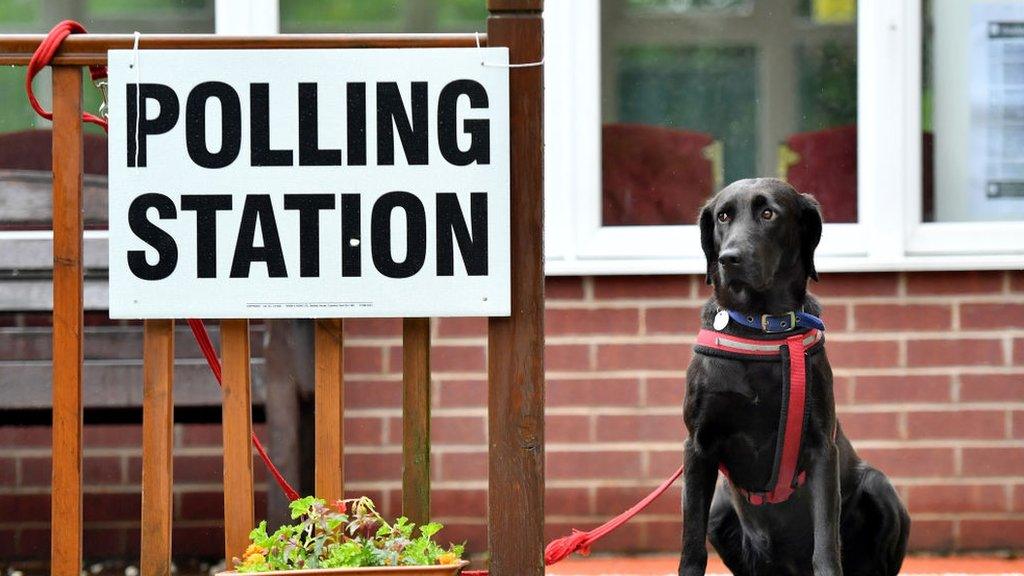
- Published11 July 2019
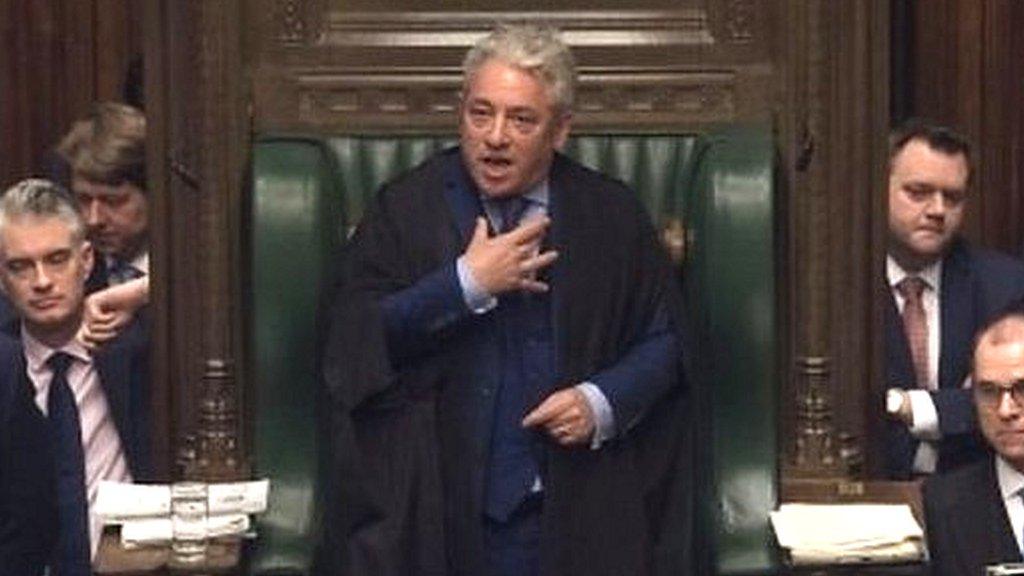
- Published3 September 2019
